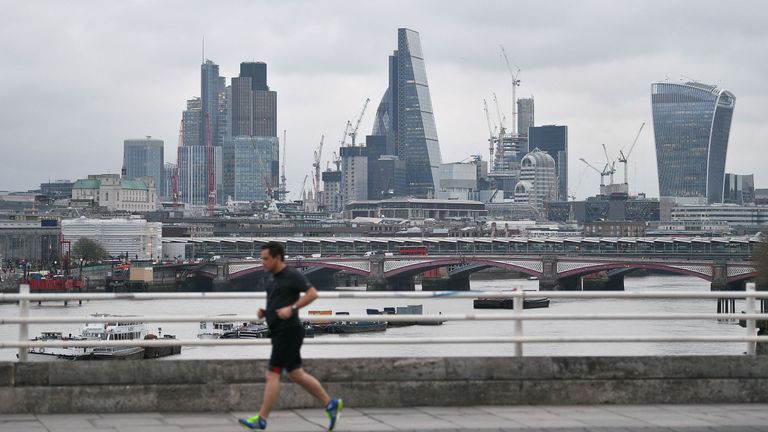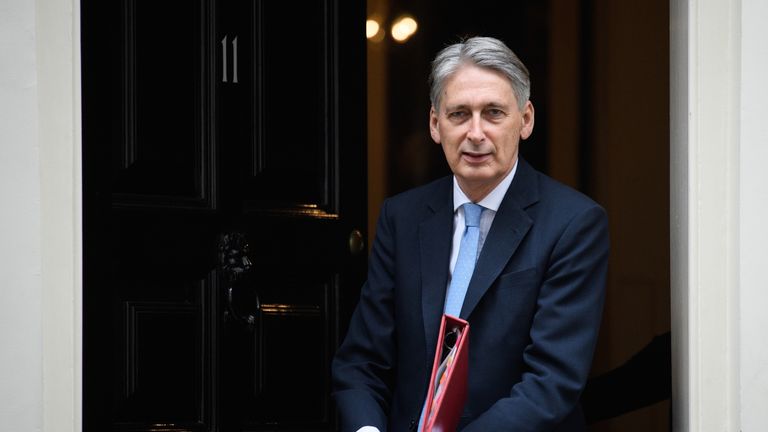Boardroom pay reforms show May's domestic agenda has withered away
The PM's plans for boardroom pay are a far cry from the root and branch reform she had said was her ambition only a year ago.
Tuesday 29 August 2017 12:12, UK
Corporate governance doesn't sound sexy. It doesn't even sound very interesting. But in the heady days of Theresa May's ascension to the premiership it came to epitomise the change of gear between her and David Cameron.
Mrs May - and her then-chief policy adviser Nick Timothy - thought that the Brexit referendum result was about more than the EU or immigration or sovereignty.
It was a "cri de coeur" from ordinary voters that the model of the British economy was broken, rigged in favour of big business and a corporate boss class who seemed to take all the rewards when things were good and pay little penalty when things went bad.
In this she started to sound a little like Ed Miliband or Teddy Roosevelt or Joseph Chamberlain, a radical Liberal turned Conservative from the late 19th century and a hero of Mr Timothy.
Mr Chamberlain was someone who was unafraid to use the power of the state to interfere in markets when required for the public good. So for instance as mayor of Birmingham he took local gas and water companies into public ownership (effectively local nationalisation). He was supposed to be the PM's new inspiration.
This was a far cry from the diet of unalloyed free-market Thatcherism from which the Tory party had fed since the mid-1970s. You certainly couldn't have imagined the words of our second female prime minister coming out of the mouth of our first:
"I want to see changes in the way that big business is governed. The people who run big businesses are supposed to be accountable to outsiders, to non-executive directors, who are supposed to ask the difficult questions, think about the long-term and defend the interests of shareholders.
"In practice, they are drawn from the same, narrow social and professional circles as the executive team and - as we have seen time and time again - the scrutiny they provide is just not good enough.
"So if I'm Prime Minister, we're going to change that system - and we're going to have not just consumers represented on company boards, but employees as well."
She went on to make a second, some would say anti-business pledge:
"We're the Conservative Party, and yes we're the party of enterprise, but that does not mean we should be prepared to accept that anything goes … So as part of the changes I want to make to corporate governance, I want to make shareholder votes on corporate pay not just advisory but binding."
This pledge was also included in the Conservative 2017 election manifesto.
Together she said these two changes would help create "a different kind of Conservatism … a break with the past." This would be a different Tory party and a different Britain too.
We now know that both of these reforms, which would have been a major transformation to the way British capitalism is governed, will not be included in the Government's proposals to be brought forward today.
There will be some change. For example, firms .
But they are a far cry from the root and branch reform Mrs May had said was her ambition only a year ago.
In that speech she also spoke of the importance of the creation of new grammar schools. That is also dead. The domestic agenda of Mrs May seems to have almost entirely withered away.
Perhaps that is not surprising given the disastrous election result.
She doubtless didn't wish to risk defeat in the Commons if some of her Thatcherite backbenchers rebelled. Or worse could only get the measures through on Labour votes.
Thus alongside the unravelling of Mrs May's domestic agenda this saga also throws up one of the deep paradoxes of Brexit.
Let's assume the PM was sincere in her wish to reform British capitalism, and I think she probably was.
Had she come to office in different circumstances, without the Brexit behemoth looming large, she would have perhaps felt able to flex her muscles and be tougher on business.
But with economic numbers going south and the lack of progress on a trade deal worrying UK plc she probably felt unable to announce anything which business would consider a disincentive to invest in the UK.
Moreover if we also accept that the May analysis was right, that the vote was a wail of anger, a plea for governments to tame the power of massive companies and protect us against the rougher edges of globalisation and corporate greed, then it is a deep irony that the Brexit process seems to be making it harder for Britain to do much about it.
And if no deal is reached, that paradox may get all the more acute.
One option long discussed in Whitehall (and the veiled threat Chancellor Philip Hammond made earlier in the year) has been to pull the only other lever Britain might have in its arsenal if a deal is not forthcoming: to become a low-corporate tax (perhaps even tax haven) off the coast of Europe.
Slash business taxes, liberalise labour law, reduce regulation: the Singapore option, one where, in the PM's words, in business "anything goes."
I wonder if this is what many voters would have had in mind when they put their cross in the box and voted to "take control".
Mrs May was asked during the election what Mayism was. She denied such a thing existed saying there was only Conservatism.
But that was misleading.
She had begun to sketch out what Mayism was. It would have been different to Margaret Thatcher and David Cameron.
But Brexit and the General Election have both come together to reset the Conservative party back to its default setting. Mr Chamberlain, surely, would not have approved.






